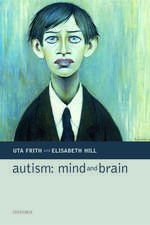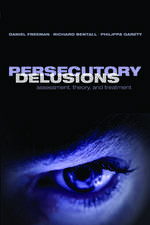The Treatment of Obsessions: Cognitive Behaviour Therapy: Science and Practice
Autor Stanley Rachmanen Limba Engleză Paperback – 9 ian 2003
Preț: 558.99 lei
Preț vechi: 745.80 lei
-25% Nou
Puncte Express: 838
Preț estimativ în valută:
106.98€ • 111.27$ • 88.31£
106.98€ • 111.27$ • 88.31£
Carte tipărită la comandă
Livrare economică 03-09 aprilie
Preluare comenzi: 021 569.72.76
Specificații
ISBN-13: 9780198515371
ISBN-10: 0198515375
Pagini: 172
Dimensiuni: 156 x 234 x 10 mm
Greutate: 0.28 kg
Editura: OUP OXFORD
Colecția OUP Oxford
Seria Cognitive Behaviour Therapy: Science and Practice
Locul publicării:Oxford, United Kingdom
ISBN-10: 0198515375
Pagini: 172
Dimensiuni: 156 x 234 x 10 mm
Greutate: 0.28 kg
Editura: OUP OXFORD
Colecția OUP Oxford
Seria Cognitive Behaviour Therapy: Science and Practice
Locul publicării:Oxford, United Kingdom
Recenzii
This book is essential reading for clinicians working in mental health settings. It would also be of interest to trainee clinical psychologists, psychiatrists, nurses, occupational therapists and social workers. I will most certainly use this manual, which is a most welcome volume and great contribution to the practice of CBT.
. . . a welcome addition to the treatment strategies clinicians can employ in managing patients with obsessions . . . This is a gem of a book and will be extrememly helpful for therapists.
Stanley Rachman is a gifted speaker and writer and The Treatment of Obsessions is a good proof of these qualities. He presents a clear and succinct account of the topic in his simple and elegant style.
. . . a welcome addition to the treatment strategies clinicians can employ in managing patients with obsessions . . . This is a gem of a book and will be extrememly helpful for therapists.
Stanley Rachman is a gifted speaker and writer and The Treatment of Obsessions is a good proof of these qualities. He presents a clear and succinct account of the topic in his simple and elegant style.
















